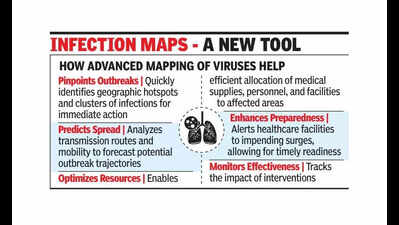Chennai: The Tamil Nadu State Public Health Laboratory will begin publishing a monthly map detailing the prevalence of circulating viruses, aiming to enhance its surveillance of infectious diseases. This initiative, announced by the Directorate of Public Health (DPH), will equip infectious disease experts with crucial data and aid officials in initiating measures to prevent or contain outbreaks of illnesses such as pneumonia, SARS, H1N1 or Covid-19. The DPH has partnered with the National Centre for Disease Control to conduct systematic monthly testing and mapping of respiratory disease cases.
The state lab now collects random samples when there is a seasonal surge in diseases, analysing samples once every three or four months. "With testing kits and funds from the Centre, advanced mapping will be done every month with samples from all 38 districts," said Director of Public Health Dr T S Selvavinayagam. Samples of patients reporting respiratory troubles due to influenza-like illness (ILI), severe acute respiratory infection (SARI), and acute respiratory distress syndrome (ARDS) from private and public hospitals across the state will be collected and brought to the state lab for tests.

"It can pinpoint the location of confirmed virus cases, creating visual representations of the outbreak's progression across different areas. This allows health officers to identify geographic hotspots or clusters of infections, indicating potential areas of transmission that require immediate attention and resource allocation," he said. "We will also understand transmission dynamics.
For instance, clusters emerging along transportation routes might suggest travel as a significant factor," he said. Besides helping public health experts, the mapping can have significant implications for treatment. When mapping reveals a sudden surge in a particular disease in a specific geographic area, healthcare facilities in that region can be alerted early.
"This allows them to prepare for a potential influx of patients, ensuring they have adequate staffing, beds, and necessary medications readily available," said a senior official. "There will be no surprise like we had during the Covid-19 pandemic," he said. The state lab will also do whole genome sequencing to study the predominant gene in circulation.
"This information can be crucial for informing treatment protocols. For instance, if a particular strain is known to be resistant to certain antiviral medications, doctors in that area can adjust their treatment strategies accordingly, opting for more effective alternatives," Dr Selva Vinayagam said..
















